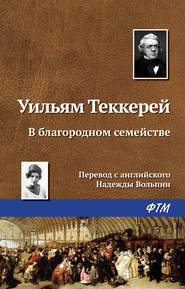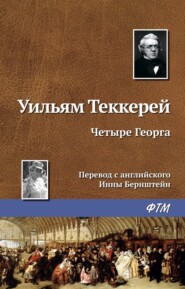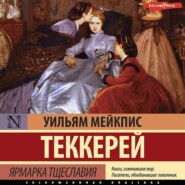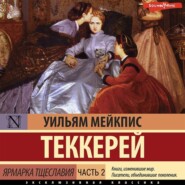По всем вопросам обращайтесь на: info@litportal.ru
(©) 2003-2024.
✖
Vanity Fair
Настройки чтения
Размер шрифта
Высота строк
Поля
“It seems to me,—” Captain Dobbin began.
“Seems be hanged, Dobbin,” his junior interrupted him. “I am under obligations to you, I know it, a d—d deal too well too; but I won’t be always sermonised by you because you’re five years my senior. I’m hanged if I’ll stand your airs of superiority and infernal pity and patronage. Pity and patronage! I should like to know in what I’m your inferior?”
“Are you engaged?” Captain Dobbin interposed.
“What the devil’s that to you or any one here if I am?”
“Are you ashamed of it?” Dobbin resumed.
“What right have you to ask me that question, sir? I should like to know,” George said.
“Good God, you don’t mean to say you want to break off?” asked Dobbin, starting up.
“In other words, you ask me if I’m a man of honour,” said Osborne fiercely; “is that what you mean? You’ve adopted such a tone regarding me lately that I’m—if I’ll bear it any more.”
“What have I done? I’ve told you you were neglecting a sweet girl, George. I’ve told you that when you go to town you ought to go to her, and not to the gambling-houses about St. James’s.”
“You want your money back, I suppose,” said George with a sneer.
“Of course I do—I always did, didn’t I?” says Dobbin. “You speak like a generous fellow.”
“No, hang it, William, I beg your pardon”—here George interposed in a fit of remorse; “you have been my friend in a hundred ways, Heaven knows. You’ve got me out of a score of scrapes. When Crawley of the Guards won that sum of money of me I should have been done but for you: I know I should. But you shouldn’t deal so hardly with me; you shouldn’t be always catechising me. I am very fond of Amelia; I adore her, and that sort of thing. Don’t look angry. She’s faultless; I know she is. But you see there’s no fun in winning a thing unless you play for it. Hang it: the regiment’s just back from the West Indies, I must have a little fling, and then when I’m married I’ll reform; I will upon my honour, now. And—I say—Dob—don’t be angry with me, and I’ll give you a hundred next month, when I know my father will stand something handsome; and I’ll ask Heavytop for leave, and I’ll go to town, and see Amelia to-morrow—there now, will that satisfy you?”
“It is impossible to be long angry with you, George,” said the good-natured Captain; “and as for the money, old boy, you know if I wanted it you’d share your last shilling with me.”
“That I would, by Jove, Dobbin,” George said, with the greatest generosity, though by the way he never had any money to spare.
“Only I wish you had sown those wild oats of yours, George. If you could have seen poor little Miss Emmy’s face when she asked me about you the other day, you would have pitched those billiard-balls to the deuce. Go and comfort her, you rascal. Go and write her a long letter. Do something to make her happy; a very little will.”
“I believe she’s d—d fond of me,” the Lieutenant said, with a self-satisfied air; and went off to finish the evening with some jolly fellows in the mess-room.
Amelia meanwhile, in Russell Square, was looking at the moon, which was shining upon that peaceful spot, as well as upon the square of the Chatham barracks, where Lieutenant Osborne was quartered, and thinking to herself how her hero was employed. Perhaps he is visiting the sentries, thought she; perhaps he is bivouacking; perhaps he is attending the couch of a wounded comrade, or studying the art of war up in his own desolate chamber. And her kind thoughts sped away as if they were angels and had wings, and flying down the river to Chatham and Rochester, strove to peep into the barracks where George was…. All things considered, I think it was as well the gates were shut, and the sentry allowed no one to pass; so that the poor little white-robed angel could not hear the songs those young fellows were roaring over the whisky-punch.
The day after the little conversation at Chatham barracks, young Osborne, to show that he would be as good as his word, prepared to go to town, thereby incurring Captain Dobbin’s applause. “I should have liked to make her a little present,” Osborne said to his friend in confidence, “only I am quite out of cash until my father tips up.” But Dobbin would not allow this good nature and generosity to be balked, and so accommodated Mr. Osborne with a few pound notes, which the latter took after a little faint scruple.
And I daresay he would have bought something very handsome for Amelia; only, getting off the coach in Fleet Street, he was attracted by a handsome shirt-pin in a jeweller’s window, which he could not resist; and having paid for that, had very little money to spare for indulging in any further exercise of kindness. Never mind: you may be sure it was not his presents Amelia wanted. When he came to Russell Square, her face lighted up as if he had been sunshine. The little cares, fears, tears, timid misgivings, sleepless fancies of I don’t know how many days and nights, were forgotten, under one moment’s influence of that familiar, irresistible smile. He beamed on her from the drawing-room door—magnificent, with ambrosial whiskers, like a god. Sambo, whose face as he announced Captain Osbin (having conferred a brevet rank on that young officer) blazed with a sympathetic grin, saw the little girl start, and flush, and jump up from her watching-place in the window; and Sambo retreated; and as soon as the door was shut, she went fluttering to Lieutenant George Osborne’s heart as if it was the only natural home for her to nestle in. Oh, thou poor panting little soul! The very finest tree in the whole forest, with the straightest stem and the strongest arms, and the thickest foliage, wherein you choose to build and coo, may be marked for what you know, and may be down with a crash ere long. What an old, old simile that is, between man and timber.
In the meanwhile, George kissed her very kindly on her forehead and glistening eyes, and was very gracious and good; and she thought his diamond shirt-pin (which she had not known him to wear before) the prettiest ornament ever seen.
The observant reader, who has marked our young Lieutenant’s previous behaviour, and has preserved our report of the brief conversation which he has just had with Captain Dobbin, has possibly come to certain conclusions regarding the character of Mr. Osborne. Some cynical Frenchman has said that there are two parties to a love transaction; the one who loves, and the other who condescends to be so treated. Perhaps the love is occasionally on the man’s side; perhaps on the lady’s. Perhaps some infatuated swain has ere this mistaken insensibility for modesty, dullness for maiden reserve, mere vacuity for sweet bashfulness, and a goose, in a word, for a swan. Perhaps some beloved female subscriber has arrayed an ass in the splendour and glory of her imagination; admired his dullness as manly simplicity; worshipped his selfishness as manly superiority; treated his stupidity as majestic gravity, and used him as the brilliant fairy Titania did a certain weaver at Athens. I think I have seen such comedies of errors going on in the world. But this is certain, that Amelia believed her lover to be one of the most gallant and brilliant men in the empire: and it is possible Lieutenant Osborne thought so too.
He was a little wild: how many young men are; and don’t girls like a rake better than a milksop? He hadn’t sown his wild oats as yet, but he would soon; and quit the army now that peace was proclaimed; the Corsican monster locked up at Elba; promotion by consequence over; and no chance left for the display of his undoubted military talents and valour: and his allowance, with Amelia’s settlement, would enable them to take a snug place in the country somewhere, in a good sporting neighbourhood; and he would hunt a little, and farm a little; and they would be very happy. As for remaining in the army as a married man, that was impossible. Fancy Mrs. George Osborne in lodgings in a county town; or, worse still, in the East or West Indies, with a society of officers, and patronised by Mrs. Major O’Dowd? Amelia died with laughing at Osborne’s stories about Mrs. Major O’Dowd. He loved her much too fondly to subject her to that horrid woman and her vulgarities, and the rough treatment of a soldier’s wife. He didn’t care for himself—not he; but his dear little girl should take the place in society to which, as his wife, she was entitled: and to those proposals you may be sure she acceded, as she would to any other from the same author.
Holding this kind of conversation, and building numberless castles in the air (which Amelia adorned with all sorts of flower-gardens, rustic walks, country churches, Sunday schools, and the like; while George had his mind’s eye directed to the stables, the kennel, and the cellar), this young pair passed away a couple of hours very pleasantly; and as the Lieutenant had only that single day in town, and a great deal of most important business to transact, it was proposed that Miss Emmy should dine with her future sisters-in-law. This invitation was accepted joyfully. He conducted her to his sisters; where he left her talking and prattling in a way that astonished those ladies, who thought that George might make something of her; and he then went off to transact his business.
In a word, he went out and ate ices at a pastry-cook’s shop in Charing Cross; tried a new coat in Pall Mall; dropped in at the Old Slaughters’, and called for Captain Cannon; played eleven games at billiards with the Captain, of which he won eight, and returned to Russell Square half-an-hour late for dinner, but in very good humour.
It was not so with old Mr. Osborne. When that gentleman came from the City, and was welcomed in the drawing-room by his daughters and the elegant Miss Wirt, they saw at once by his face—which was puffy, solemn, and yellow at the best of times—and by the scowl and twitching of his black eye-brows, that the heart within his large white waistcoat was disturbed and uneasy. When Amelia stepped forward to salute him, which she always did with great trembling and timidity, he gave a surly grunt of recognition, and dropped the little hand out of his great hirsute paw without any attempt to hold it there. He looked round gloomily at his eldest daughter; who, comprehending the meaning of his look, which asked unmistakably, “Why the devil is she here?” said at once—
“George is in town, Papa; and has gone to the Horse Guards, and will be back to dinner.”
“Oh, he is, is he? I won’t have the dinner kept waiting for him, Jane;” with which this worthy man lapsed into his particular chair, and then the utter silence in his genteel, well-furnished drawing-room was only interrupted by the alarmed ticking of the great French clock.
When that chronometer, which was surmounted by a cheerful brass group of the sacrifice of Iphigenia, tolled five in a heavy cathedral tone, Mr. Osborne pulled the bell at his right hand violently, and the butler rushed up.
“Dinner!” roared Mr. Osborne.
“Mr. George isn’t come in, sir,” interposed the man.
“Damn Mr. George, sir. Am I master of the house? Dinner!” Mr. Osborne scowled. Amelia trembled. A telegraphic communication of eyes passed between the other three ladies. The obedient bell in the lower regions began ringing the announcement of the meal. The tolling over, the head of the family thrust his hands into the great tail-pockets of his great blue coat and brass buttons, and without waiting for a further announcement, strode downstairs alone, scowling over his shoulder at the four females.
“What’s the matter now, my dear?” asked one of the other, as they rose and tripped gingerly behind the sire.
“I suppose the funds are falling,” whispered Miss Wirt; and so, trembling and in silence, this hushed female company followed their dark leader. They took their places in silence. He growled out a blessing, which sounded as gruffly as a curse. The great silver dish-covers were removed. Amelia trembled in her place, for she was next to the awful Osborne, and alone on her side of the table—the gap being occasioned by the absence of George.
“Soup?” says Mr. Osborne, clutching the ladle, fixing his eyes on her, in a sepulchral tone; and having helped her and the rest, did not speak for a while.
“Take Miss Sedley’s plate away,” at last he said. “She can’t eat the soup—no more can I. It’s beastly. Take away the soup, Hicks, and to-morrow turn the cook out of the house, Jane.”
Having concluded his observations upon the soup, Mr. Osborne made a few curt remarks respecting the fish, also of a savage and satirical tendency, and cursed Billingsgate with an emphasis quite worthy of the place. Then he lapsed into silence, and swallowed sundry glasses of wine, looking more and more terrible, till a brisk knock at the door told of George’s arrival, when everybody began to rally.
“He could not come before. General Daguilet had kept him waiting at the Horse Guards. Never mind soup or fish. Give him anything—he didn’t care what. Capital mutton—capital everything.” His good humour contrasted with his father’s severity; and he rattled on unceasingly during dinner, to the delight of all—of one especially, who need not be mentioned.
As soon as the young ladies had discussed the orange and the glass of wine which formed the ordinary conclusion of the dismal banquets at Mr. Osborne’s house, the signal to make sail for the drawing-room was given, and they all arose and departed. Amelia hoped George would soon join them there. She began playing some of his favourite waltzes (then newly imported) at the great carved-legged, leather-cased grand piano in the drawing-room overhead. This little artifice did not bring him. He was deaf to the waltzes; they grew fainter and fainter; the discomfited performer left the huge instrument presently; and though her three friends performed some of the loudest and most brilliant new pieces of their repertoire, she did not hear a single note, but sat thinking, and boding evil. Old Osborne’s scowl, terrific always, had never before looked so deadly to her. His eyes followed her out of the room, as if she had been guilty of something. When they brought her coffee, she started as though it were a cup of poison which Mr. Hicks, the butler, wished to propose to her. What mystery was there lurking? Oh, those women! They nurse and cuddle their presentiments, and make darlings of their ugliest thoughts, as they do of their deformed children.
The gloom on the paternal countenance had also impressed George Osborne with anxiety. With such eyebrows, and a look so decidedly bilious, how was he to extract that money from the governor, of which George was consumedly in want? He began praising his father’s wine. That was generally a successful means of cajoling the old gentleman.
“We never got such Madeira in the West Indies, sir, as yours. Colonel Heavytop took off three bottles of that you sent me down, under his belt the other day.”
“Did he?” said the old gentleman. “It stands me in eight shillings a bottle.”
“Will you take six guineas a dozen for it, sir?” said George, with a laugh. “There’s one of the greatest men in the kingdom wants some.”
“Does he?” growled the senior. “Wish he may get it.”
“When General Daguilet was at Chatham, sir, Heavytop gave him a breakfast, and asked me for some of the wine. The General liked it just as well—wanted a pipe for the Commander-in-Chief. He’s his Royal Highness’s right-hand man.”
“It is devilish fine wine,” said the Eyebrows, and they looked more good-humoured; and George was going to take advantage of this complacency, and bring the supply question on the mahogany, when the father, relapsing into solemnity, though rather cordial in manner, bade him ring the bell for claret. “And we’ll see if that’s as good as the Madeira, George, to which his Royal Highness is welcome, I’m sure. And as we are drinking it, I’ll talk to you about a matter of importance.”
Amelia heard the claret bell ring as she sat nervously upstairs. She thought, somehow, it was a mysterious and presentimental bell. Of the presentiments which some people are always having, some surely must come right.
“What I want to know, George,” the old gentleman said, after slowly smacking his first bumper—“What I want to know is, how you and—ah—that little thing upstairs, are carrying on?”
“I think, sir, it’s not hard to see,” George said, with a self-satisfied grin. “Pretty clear, sir.—What capital wine!”
“What d’you mean, pretty clear, sir?”
“Why, hang it, sir, don’t push me too hard. I’m a modest man. I—ah—I don’t set up to be a lady-killer; but I do own that she’s as devilish fond of me as she can be. Anybody can see that with half an eye.”

















